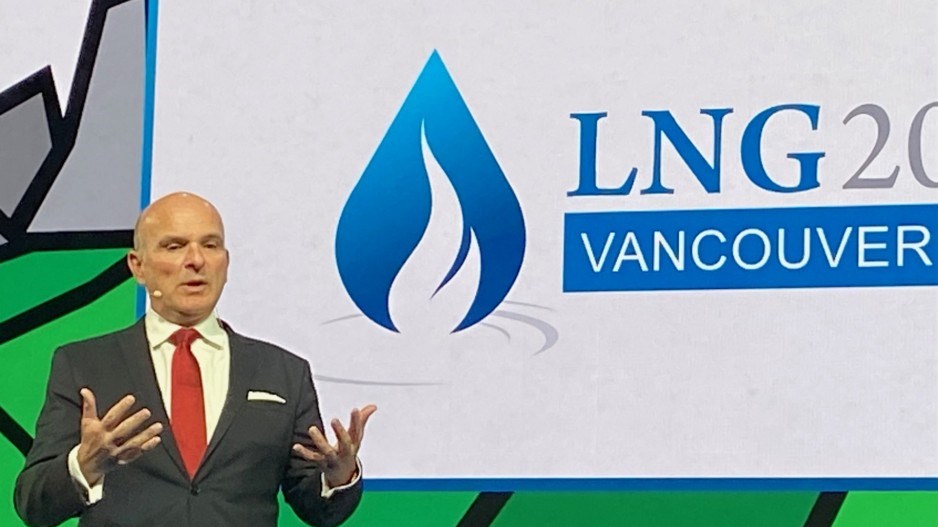Europe dodged a bullet last winter with relatively warm weather, which made an energy crisis not nearly as excruciating as it might have been, had it been colder.
But the energy crisis is by no means over. It could last for years, energy experts say, and it’s now clear that natural gas and liquefied natural gas will continue to play a crucial role in an energy transition.
That was the consensus of a diplomatic forum involving 100 diplomats, Indigenous and industry leaders from 30 countries Monday at the global LNG2023 conference being held in Vancouver.
“There was clear consensus that we’re still in the energy crisis,” Mel Ydreos, LNG2023’s executive director, said at a press conference this morning attended by Ian McKay, Canadian ambassador to Japan, and David MacNaughton, former Canadian ambassador to the U.S.
“When we navigate out of the current energy crisis, there was strong consensus that LNG will be needed to grow economies, mainly in the developed world,” Ydreos said in a summary of the diplomatic forum. “There’s discussions about perhaps reducing the dependency on LNG. It will take a significant amount of time before that happens.”
McKay noted that it was five years ago that the partners in the LNG Canada project announced a final investment decision in the $40 billion LNG project in B.C.
Since then, there has been an intense focus on addressing climate change, with many countries adopting net zero targets that many have assumed will mean a declining role for natural gas and LNG in the energy transition.
The International Energy Agency (IEA), for example, warned in 2021 that no new major oil and gas field of large-scale LNG developments not already in the queue will be needed.
Then, last year, Russia invaded Ukraine, deepening an energy crisis in Europe that had, in fact, already been brewing, thanks to overly optimistic expectations of renewables quickly replacing fossil fuels and an under-investment in natural gas.
Gas prices in Europe skyrocketed, and poorer countries that could not afford the high prices were forced to revert to coal to keep the lights on.
“Places like Pakistan, for example, have had to go back to coal-fired power stations,” said Meg O’Neil, CEO and managing director of Woodside Energy. “Places like Bangladesh have had rolling blackouts because they can’t afford LNG. So there’s been a real tragedy outside of Europe that’s been catalyzed by what happened in Russia.”
The energy crisis has once again attenuated focus on energy security and affordability.
Saad Sherida Al-Kaabi, minister of Energy for Qatar, the world’s largest LNG exporter, noted that concerns about energy security and affordability were already a growing problem in Europe before Russia’s invasion of Ukraine.
“The Ukrainian crisis only emphasized the issue,” he said. “But if you go back to look at the prices and what was happening just before that, the prices were actually climbing. Under-investment in oil and gas in general over the last 10 years are the reason that you have an issue.”
Liberal MP Randy Boissonnault, Canada’s minister of tourism and associate minister of finance, acknowledged in a keynote address Tuesday that LNG can play a role in decarbonization.
“When done right, LNG can help displace significant emissions,” he said. “Fact is that natural gas produces half as much carbon dioxide as coal, making it an important source of energy for consumers as we move to a lower carbon future.”
Citing the International Energy Agency (IEA), he said switching from coal to natural gas has avoided an estimated 500 million tonnes of CO2 since 2010 globally.
“LNG and renewable natural gas present strong potential to replace higher emitting fossil fuels like coal, while reducing reliance on fossil fuels from Russia and other countries that seek to use energy as a weapon of intimidation,” Boissonnault said. “Canada is well-positioned to be a stable and reliable supplier of choice for LNG and so many green technologies vital to our shared future.”
But if governments are serious about supporting LNG export capacity, they need to provide greater regulatory and permitting certainty, said Greg Ebel, CEO of Enbridge (TSX,NYSE:ENB), which owns 25 per cent of the natural gas infrastructure in North America.
The industry is exploring how to reduce its emissions intensity with things like electrification and carbon capture and storage. But that too requires timely permitting.
"I think the number one challenge for us is just permitting and certainty," Ebel said. “I would say that is the number one issue that I see in terms of holding us back."





